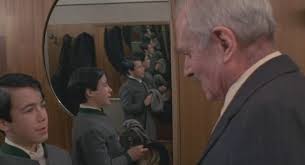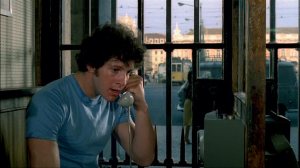 Joey at Wolffian’s Classic Movie Digest hosts The Vivien Leigh and Laurence Olivier Blogathon which presents a wonderful opportunity to discuss my favorite Laurence Olivier film The Boys From Brazil.
Joey at Wolffian’s Classic Movie Digest hosts The Vivien Leigh and Laurence Olivier Blogathon which presents a wonderful opportunity to discuss my favorite Laurence Olivier film The Boys From Brazil.
Based on the novel by Ira Levin, The Boys From Brazil, the film stars Laurence Olivier, Gregory Peck, James Mason, Denholm Elliot, Steve Guttenberg, Lilli Palmer and method acting guru Uta Hagen (my favorite). Levin penned the best thrillers from the late 60s and 70s Rosemary’s Baby, The Stepford Wives, and Death Trap.
In the film, Laurence Olivier plays Ezra Lieberman, author, a holocaust survivor, and Nazi War criminal hunter. Real-life Nazi hunter and author Simon Wiesenthal was the basis for Olivier’s character.
Wiesenthal was not a fan of Levin’s book, describing it as “insane fiction” (Segev, 332). Though not enamored with the book, Weisenthal helped Olivier prepare for the role. Wiesenthal was disappointed in Olivier’s performance stating Lieberman was “neither my style nor my way of acting” (333).
While Olivier may not play Wiesenthal well, he plays an excellent Lieberman!
The Plot and a Side Note, or Two
Ezra Lieberman receives a tip from a young Jewish photographer Barry Kohler (Guttenberg), Dr. Josef Mengele (Gregory Peck) is alive and living in Paraguay. Lieberman tells Barry to leave the area. Inspired by Lieberman’s books Kohler remains in Paraguay, investigates and uncovers a Nazi plot to kill 94 men, all civil servants aged 65 within the next two and half years. Kohler is caught and murdered, but before he dies, he gets the information to Lieberman.
Lieberman becomes suspicious and visits a journalist friend Sydney (Denholm Elliot). The journalist believes the story is preposterous, yet he assists Lieberman, he sends the press clippings for the death of every 65-year-old civil servant. As Lieberman begins investigating the families, he discovers an odd similarity, many of these families have an adopted male son. These boys are all aged 12, and all are identical (Jeremy Black) with the same personality.

Black & Olivier (The Boys From Brazil) Ah, I see what you did there, clever foreshadowing with the mirror
Meanwhile, we discover Mengele’s plot is quite sinister. Using Adolph Hitler’s genetic material Dr. Mengele replicates Hitler, 94 times. 94 children were put up for adoption and sent to live with Nordic Christian families in various countries throughout the world. Not leaving anything to chance, Mengele and his cohorts place the children in families whose background would replicate Hitler’s upbringing the mothers all loving and approximately aged 42, the fathers are abusive civil servants approximately aged 65. According to the plan, when the children reach 12, the fathers will die.
Lieberman continues his investigation and obtains a short list of families in the U.S. with clone children from a woman who assisted with the adoptions, played by Uta Hagen. As it turns out, all the babies came from Brazil.
Let me take a moment away from the film to talk about Uta Hagen, a famous acting teacher who co-founded the HB Studio. Hagen’s Respect for Acting and A Challenge for the Actor are amazing books. Her approach is Method based, but her approach is less damaging than the legendary Lee Strasberg whose exercises lead actors like Julie Harris to nervous breakdowns on a regular basis.
With Hagen’s approach self-observation is the key, characters are aspects of the actor’s existing personality. In other words, Hagen builds her characters by internally imagining her responses to external stimuli.
Olivier’s approach differs from Hagen’s, his characters are an external entity, his voice and manners and reactions are his interpretation of the character’s responses.
With Olivier’s approach, the characters are separate from the actor’s personality.
Their dual presence on screen embodies the major 20th-century discourse in theater pedagogy, whether or not it is necessary to hook the character to the self. The exchange between Hagen and Olivier is fascinating for acting students because both actors come from an opposite approach.
As an observer, we can see a marked difference in their performance styles. Olivier’s performance is dynamic and highly theatrical. Hagen’s performance is realistic and like a documentary segment. Amazingly, the two are excellent together. Neither actor appears to overact or underact, despite their diverse styles. During this moment, opposite ends of the performance theory spectrum meet and interact brilliantly. Every time I watch this film, I end up rewinding this scene and watching it again.
Back to the film, Lieberman with his list in hand warns the families Mengele is coming for them. As Lieberman gets closer to the truth, Mengele’s superior Seidel (James Mason) shuts down the operation. Mengele however, will not be thwarted and so he carries out the remaining murders himself.
While the scene between Hagen and Olivier is my favorite from an actor’s perspective, from an entertainment perspective, the scene between Peck and Olivier is the scene to watch!
It is the craziest fight scene you will ever witness between two dapper senior citizens! There was some violence in the film up to this point, but it was relatively tame, the film showed the end results, not the violent acts (except for that scene when Mengele flips out at the party). Thus far violence is merely suggested.
But buckle your seatbelts. What follows is a shockingly brutal scene involving a gun, hand to hand combat, blood, Doberman Pinschers, and someone pulls a Mike Tyson!
It’s like the first director steps out for a cup of tea and Quentin Tarantino says, “I’ll finish the film. All we need is some great 70s music!”
Much of the film’s criticism stems from the final moment between Peck and Olivier, as it is jarring. But honestly, any other handling of this moment would be disappointing. I will not reveal the outcome of the fight or the end of the film because it is an exciting thriller and worth watching.
Jerry Goldsmith’s score brilliantly encapsulates the film, a Strauss-like waltz, which builds in tempo and feels violent at times, like a dance of death.
While the film is technically science fiction, I find it frightening because it is plausible. In 1978 when the film was made, Dr. Mengele was still alive and living in South America, he died in the mid-1980s. Cloning was a scientific reality in the 1970s and it is common practice in laboratory settings today. I hope no one is crazy enough to embark on an insane scheme like The Boys from Brazil, but it is not impossible.
Olivier’s performance was not “up to par” for Wiesenthal, Actor James Mason, felt it was certainly an Oscar-worthy role:
One could hardly be alive and employed in the acting profession and not know that ‘The Boys from Brazil’ had two stupendous leading roles in it. Oscar material. And of course, always trying to improve my position, I was hoping one of them would fall in my lap. … I’d rather been hoping that Larry would be preoccupied with something on the stage, but no, he was free, and so that role fell in his lap. And then the other role, as Dr. Mengele, fell into Greg Peck’s lap. … Two or three months passed, and then they called up and said they had a role for me after all. It was a supporting character, another Nazi down in Paraguay. They’d found that when Dr. Mengele was in Paraguay, he had no one to talk to, which made it rather difficult, of course, to develop character and suspense. So they fleshed out the other Nazi, and he fell into my lap.
Olivier received an Academy Award nomination for The Boys from Brazil, which he did not win. However, that year he won a well-deserved lifetime achievement award from The Academy.
The Boys from Brazil is an exciting film, the kind of film where you scream “No!” “Run!” “Oh my God!” and one of Olivier’s best performances. Be sure to visit Joey at Wolffian’s Classic Movie Digest to enjoy the full Vivien Leigh and Laurence Olivier Blogathon!
Resources
Ebert, Roger. James Mason: “The Boys from Brazil” | Interviews | Roger Ebert. Rogerebert.com. 12 Oct. 1978. Web. 22 Oct. 2015.
Hagen, Uta. A Challenge for the Actor. New York: Macmillan Publishing, 1991. Print.
Hagen, Uta with Haskel Frankel. Respect for Acting. New York: Macmillan Publishing,
1973. Print.
Garfield, David. A Player’s Place: The Story of the Actors Studio. New York:
Macmillan. 1980. Print.
Segev, Tom. Simon Wiesenthal: The Life and Legends. New York: Doubleday, 2010. Print.
Don’t forget to mark your calendars!
Ciao for now dearies!
Summer








This is a great review. great work. Thanks for taking part,you really went above and beyond the call,you get great work
LikeLiked by 1 person
Oh, thank you! That is very kind, and Thanks for hosting such a cool event, I am certain Larry and Viv would be pleased ;)!
LikeLiked by 1 person
Pingback: Vivien leigh and Laurence olivier Blogathon is here | wolffian classics movies digest
Pingback: Vivien leigh and Laurence olivier Blogathon Day one | wolffian classics movies digest
Thank you! I am looking forward to reading everything 😉
LikeLike
Cool piece. I really like this film, too, although I’m not as enamored with Olivier’s performance–but he obviously isn’t bad…because he *is* Olivier after all.
I think this is one of those films that can sort of fall through the cracks, but is a real surprise and addictive once seen for the first time.
LikeLiked by 1 person
Hey, Peter!
Thank you, this movie is a lot of fun. I am glad you saw it and enjoyed it, I always find myself in “the you haven’t seen The Boys from Brazil?” convo! 😀
-Summer
LikeLike
It’s been a long time since I’ve seen this movie. Now that I’ve read your post, I need to re-watch, especially for the Hagen vs. Olivier scene. Even so, I know what you mean about periodically yelling at the screen while watching it. (I’m a verbal movie watcher, anyway, but this one really brings it out in a person, no?)
LikeLiked by 1 person
I do think that scene is fascinating, I hope you can catch it! The Boys from Brazil Is a fun movie and definitely one to scream at, of course I also comment a lot in Jane Austen films so I might be overly verbose compared to the average viewer 😉.
LikeLiked by 1 person
Indeed, the fight scene is a marvelous climax! When would you wonder you could see Peck and Olivier rolling in he ground biting each other? Also, very nice remarks on Uta Hagen.
Thanks for the kind comment!
Kisses!
Le
LikeLiked by 1 person